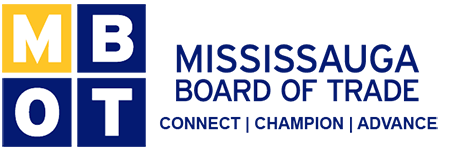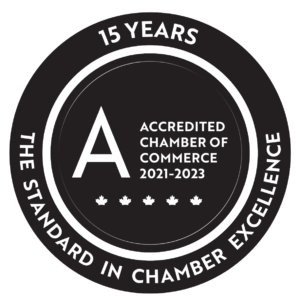Recovery has many facets and will look different for every business. One consistent theme though, regardless of your industry or the size of your business, is keeping employees safe by keeping Covid-19 out of workplaces. Continued hand washing, mask wearing and social distancing are key, but is there more that can be done?
The Mississauga Economic Recovery Group (MERG) was founded by the Mississauga Board of Trade (MBOT) specifically to help Mississauga businesses recover from the impacts of Covid-19. Early conversations amongst MERG’s 50 member CEOs identified a key recovery opportunity: workplace rapid antigen testing. This idea led to the Fast Antigen Screening Toolkit (F.A.S.T.), a free, easy-to-use, easy-to-understand online toolkit MBOT has created for businesses who wish to provide antigen screening to protect their employees.
“We saw an opportunity to meaningfully help businesses who want to take steps to protect their employees but are overwhelmed with all the information out there,” says David Wojcik, President & CEO, Mississauga Board of Trade. “It was exciting to be able to take a MERG idea and use MBOT resources to turn it into a real-time, useful product that will directly help businesses in Mississauga and beyond.”
What is F.A.S.T.
F.A.S.T. is a free online toolkit available to all interested businesses. It includes all the information you need, in one place, to implement a rapid screening program in your workplace. The resources in the toolkit are customized based on your business’ location and will be updated as recommendations from regional health authorities evolve.
F.A.S.T. includes best practices, resources and templates for all phases of an employer-led rapid screening program, including:
- Planning – things to consider before getting started
- Communication – talking to your employees about this program
- Personal Protective Equipment – what you need, where to get it, how to dispose of it
- Screening Devices – overview of options and where to get them
- On Site/Remote Screening Options – set-up options and screening frequency
- Positive Screening Result – reporting results, managing a positive test, return-to-work guidelines
“We worked closely with Peel Health, suppliers and other experts to make it as comprehensive and user-friendly as possible. As far as I’m aware there isn’t another toolkit like this out there,” says David. “I’m so proud that MBOT was able to develop and produce this world-class resource within just a few months.”
Free Antigen Screening (Testing) Devices
In addition to the toolkit, MBOT is distributing the province’s free rapid test kits which are available to small and medium-size organizations with less than 150 employees. The COVID-19 Rapid Screening Initiative is being coordinated by the Ministry of Economic Development, Job Creation and Trade along with The Ontario Chamber of Commerce. MBOT expects to distribute thousands of free kits over the coming months.
One of the greatest learning opportunities of the pandemic is in Canada’s life sciences sector. Canada incurred multiple vaccine sourcing issues, putting us behind other countries. But reliance on foreign suppliers does not have to be our future.
“We have a choice,” says Jane Chung, President, AstraZeneca Canada and MERG Sector Leader – Life Sciences & Healthcare. “We can keep doing things the same way we’ve always done them, or we can learn from the lessons of this pandemic. We need to rebuild our pharmaceutical manufacturing and supply capacities and reshape healthcare delivery with critical life sciences investments so that Canadians will have first access to medicines and first-class medical services in the future.”
The Mississauga Economic Recovery Group (MERG) has brought together some of the best minds in the life sciences private sector. For these CEOs, making Canada a go-to choice for investment in assets, talent and research through a connected, aligned life sciences ecosystem, is the only option.
Sam Ricchezza, strategic advisor with McMaster Innovation Park and past President, North America with Bora Pharmaceuticals, has stepped up to lead the charge on developing a national vision and strategy for Canada’s life sciences and healthcare sector.
“Sam is eminently qualified to take on this leadership role,” says Ellen McGregor, CEO, Fielding Environmental and Chair, MERG. “He has a wealth of knowledge and contacts, he has the patience to work with the myriad of stakeholders involved and most importantly, he’s deeply passionate about this issue. He is the puzzle master who is going to help put all the pieces together.”
Building a Comprehensive, National Life Sciences Strategy: It’s Complex
The Life Sciences industry is a large, complex ecosystem made up of many interrelated parts, from research and development, manufacturing, distribution and transportation, hospitals, community health partners and pharmacies to name just a few. It is also guided by strict policies and significant regulatory oversight from numerous federal and provincial ministries.
“We have a unique opportunity here to align all parties, including government and its policy decision-making processes, as well as the public, behind a common vision and values-based goals for the future of healthcare in this country,” says Sam.
It’s early in the strategy development process but it’s already clear that there is a collective aspiration to help make Canada one of the top health and biosciences hub in the world. A vibrant, resilient top-to-bottom ecosystem benefits everyone, including improved health outcomes for Canadians. That’s a powerful vision.
“The time is now,” says Sam. “MERG has brought us together and helped connect the dots at an opportune moment in time. We now have a case for change, momentum and critical mass. Sometimes you need to make a bold move if you want to effect change, and that’s exactly what we’re going to do.”





